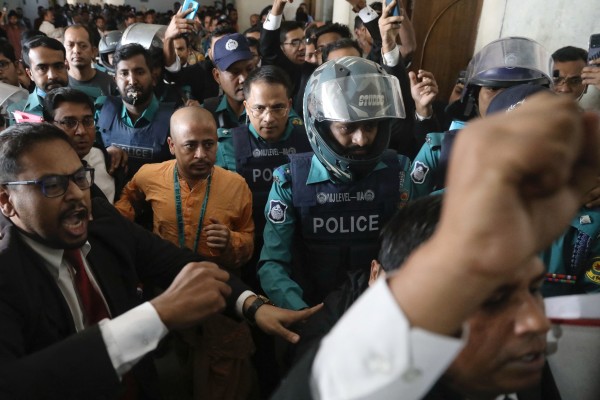
The brouhaha over the arrest in Bangladesh of ISKCON monk Chinmoy Krishna Das on the charge of sedition (for hoisting a saffron flag over the national flag), has taken a new turn. Some months ago, he and two others had been removed from their positions in ISKCON Bangladesh and all organisational activities “due to violations of discipline.”
“Their activities are not representative of ISKCON,” Charu Chandra Das, general secretary of ISKCON Bangladesh, was quoted by The Dhaka Tribune as saying. Exactly what those activities were which prompted ISKCON to remove them was not clarified. In fact, Charu Chandra Das appeared more concerned about the current situation.
He said “There are ongoing attempts to wrongly associate ISKCON Bangladesh with the death of lawyer Saiful Islam Alif in Chittagong. We want to make it clear that ISKCON Bangladesh has no involvement in this tragic event or the ongoing protests.”
He said that ISKCON Bangladesh has never been involved in communal or conflict-driven activities and only sought to promote unity and harmony. His remarks came shortly after the Dhaka High Court dismissed a petition seeking a ban on ISKCON.
Was Chandra Das’ comments about Chinmoy Das linked to the court verdict, because two days earlier, ISKCON Bangladesh had issued a statement in the name of general secretary Chandra Das which lauded the role of Chinmoy Das.
Chandra Das said, “We express our serious concern and strongly denounce the recent arrest of Chinmoy Krishna Das, spokesperson for the Bangladesh Sammilito Sanatani Jagran Jot.
“We also condemn the subsequent violence and attacks against Sanatanis in various regions of Bangladesh. We urge the government to promote peaceful coexistence for the Sanatani community.”
The statement lauded Das as a “vocal advocate for the protection of minority groups. It is essential to uphold his right to free speech and to support his efforts to encourage others to defend this right. Ensuring justice and fair treatment for him is crucial.”
No mention at all of the activities which had led the organisation to remove him from official responsibilities. One could argue that Chandra Das, as general secretary of ISKCON, was perhaps more concerned about the need to preserve and protect his institution.
It may well be that Chinmoy Das was acting outside his ambit, taking on a role not given to him by the organisation, and therefore the clarification about his position.
Thirty eight years in journalism, widely travelled, history buff with a preference for Old Monk Rum. Current interest/focus spans China, Technology and Trade. Recent reads: Steven Colls Directorate S and Alexander Frater's Chasing the Monsoon. Netflix/Prime video junkie. Loves animal videos on Facebook. Reluctant tweeter.




